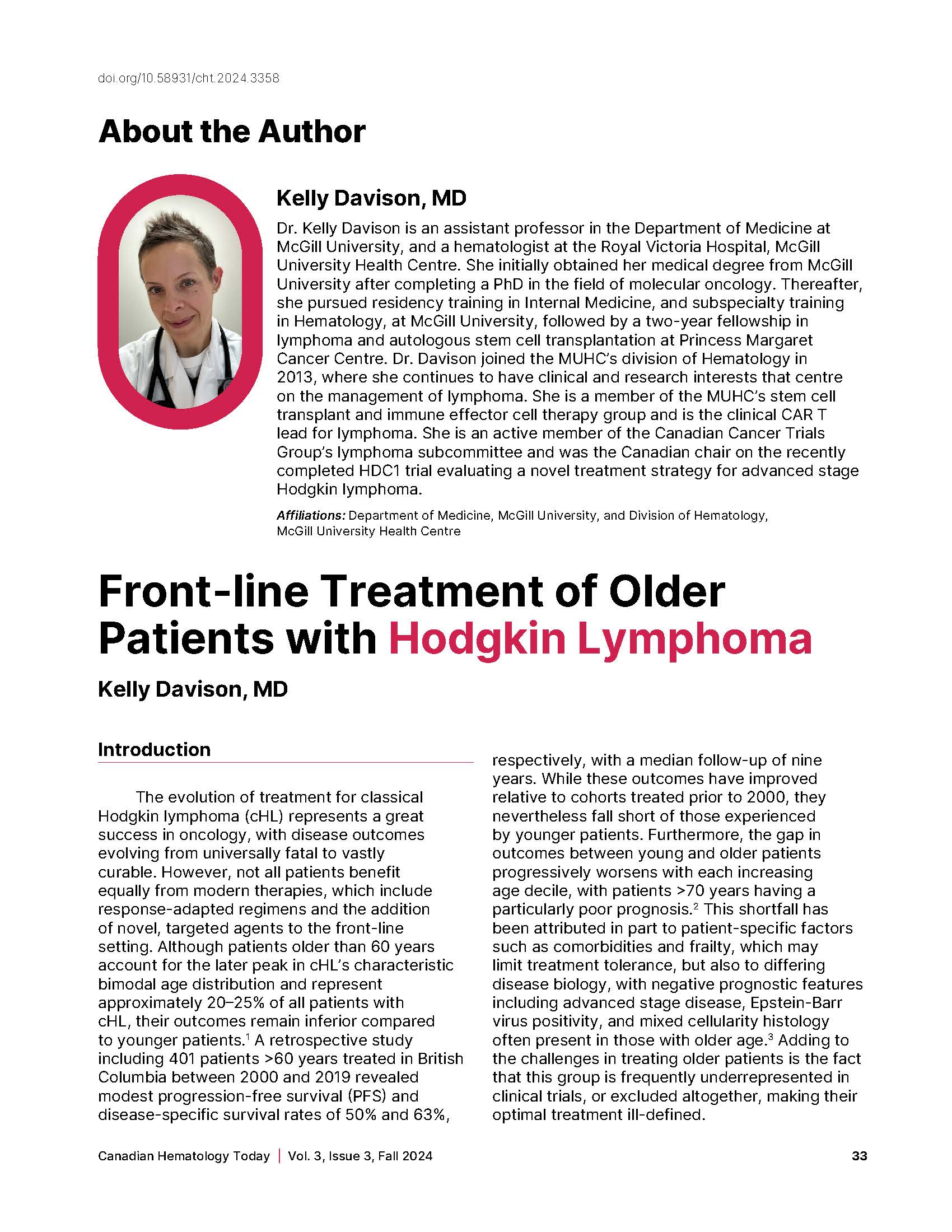Front-line Treatment of Older Patients with Hodgkin Lymphoma
DOI:
https://doi.org/10.58931/cht.2024.3358Abstract
The evolution of treatment for classical Hodgkin lymphoma (cHL) represents a great success in oncology, with disease outcomes evolving from universally fatal to vastly curable. However, not all patients benefit equally from modern therapies, which include response‑adapted regimens and the addition of novel, targeted agents to the front-line setting. Although patients older than 60 years account for the later peak in cHL’s characteristic bimodal age distribution and represent approximately 20–25% of all patients with cHL, their outcomes remain inferior compared to younger patients. A retrospective study including 401 patients >60 years treated in British Columbia between 2000 and 2019 revealed modest progression‑free survival (PFS) and disease-specific survival rates of 50% and 63%, respectively, with a median follow-up of nine years. While these outcomes have improved relative to cohorts treated prior to 2000, they nevertheless fall short of those experienced by younger patients. Furthermore, the gap in outcomes between young and older patients progressively worsens with each increasing age decile, with patients >70 years having a particularly poor prognosis. This shortfall has been attributed in part to patient-specific factors such as comorbidities and frailty, which may limit treatment tolerance, but also to differing disease biology, with negative prognostic features including advanced stage disease, Epstein-Barr virus positivity, and mixed cellularity histology often present in those with older age. Adding to the challenges in treating older patients is the fact that this group is frequently underrepresented in clinical trials, or excluded altogether, making their optimal treatment ill-defined.
References
Carter J, David KA, Kritharis A, Evens AM. Current treatment options for older patients with Hodgkin Lymphoma. Curr Treat Options Oncol. 2020;21(5):42. DOI: https://doi.org/10.1007/s11864-020-00745-9
Cheng PTM, Villa D, Gerrie AS, Freeman CL, Slack GW, Gascoyne RD, et al. The outcome of older adults with classic Hodgkin Lymphoma in British Columbia. Blood Adv. 2022;6(22):5924-32. DOI: https://doi.org/10.1182/bloodadvances.2022008258
Barrett A, Collins GP. Older patients with Hodgkin Lymphoma: Walking the tightrope of efficacy and toxicity. Front Oncol. 2022;12:1017787. DOI: https://doi.org/10.3389/fonc.2022.1017787
Zilioli VR, Muzi C, Pagani C, Ravano E, Meli E, Daffini R, et al. Current treatment options and the role of functional status assessment in classical Hodgkin Lymphoma in older adults: A review. Cancers (Basel). 2023;15(5). DOI: https://doi.org/10.3390/cancers15051515
Johnson P, Federico M, Kirkwood A, Fossa A, Berkahn L, Carella A, et al. Adapted treatment guided by interim PET-CT scan in advanced Hodgkin’s Lymphoma. N Engl J Med. 2016;374(25):2419-29. DOI: https://doi.org/10.1056/NEJMoa1510093
Behringer K, Goergen H, Hitz F, Zijlstra JM, Greil R, Markova J, et al. Omission of dacarbazine or bleomycin, or both, from the ABVD regimen in treatment of early-stage favourable Hodgkin’s Lymphoma (GHSG HD13): An open-label, randomised, non-inferiority trial. Lancet. 2015;385(9976):1418-27. DOI: https://doi.org/10.1016/S0140-6736(14)61469-0
Boll B, Goergen H, Behringer K, Brockelmann PJ, Hitz F, Kerkhoff A, et al. Bleomycin in older early-stage favorable Hodgkin Lymphoma patients: analysis of the German Hodgkin Study Group (GHSG) HD10 and HD13 trials. Blood. 2016;127(18):2189-92. DOI: https://doi.org/10.1182/blood-2015-11-681064
Evens AM, Connors JM, Younes A, Ansell SM, Kim WS, Radford J, et al. Older patients (aged >/=60 years) with previously untreated advanced-stage classical Hodgkin lymphoma: A detailed analysis from the phase III ECHELON-1 study. Haematologica. 2022;107(5):1086-94. DOI: https://doi.org/10.3324/haematol.2021.278438
Ansell SM, Radford J, Connors JM, Dlugosz-Danecka M, Kim WS, Gallamini A, et al. Overall survival with brentuximab vedotin in stage III or IV Hodgkin’s Lymphoma. N Engl J Med. 2022;387(4):310-20. DOI: https://doi.org/10.1056/NEJMoa2206125
Evens AM, Advani RH, Helenowski IB, Fanale M, Smith SM, Jovanovic BD, et al. Multicenter phase II study of sequential brentuximab vedotin and doxorubicin, vinblastine, and dacarbazine chemotherapy for older patients with untreated classical Hodgkin Lymphoma. J Clin Oncol. 2018;36(30):3015-22. DOI: https://doi.org/10.1200/JCO.2018.79.0139
Borchmann P, Ferdinandus J, Schneider G, Moccia A, Greil R, Hertzberg M, et al. Assessing the efficacy and tolerability of PET-guided BrECADD versus eBEACOPP in advanced-stage, classical Hodgkin Lymphoma (HD21): a randomised, multicentre, parallel, open-label, phase 3 trial. Lancet. 2024;404(10450):341-52. DOI: https://doi.org/10.1016/S0140-6736(24)01315-1
Herrera et al. Nivolumab + AVD in advanced-stage classic Hodkgin’s lymphoma. NEJM. 2024;439
Rutherford SC, Li H, Herrera AF, Leblanc M, Ahmed S, Davison KL, et al. Nivolumab-AVD is better tolerated and improves progression-free survival compared to Bv-AVD in older patients (aged ≥60 years) with advanced stage Hodgkin Lymphoma enrolled on SWOG S1826. Blood. 2023;142(Supplement 1):181-. DOI: https://doi.org/10.1182/blood-2023-180114
Torka P, Feldman T, Savage K, Ganesan N, Hancock H, Davey T, et al. Phase 2 trial of nivolumab plus adriamycin, vinblastine, dacarbazine (N-AVD) as frontline therapy in older adults with Hodgkin Lymphoma. Hematological Oncology. 2023;41(S2):161-2. DOI: https://doi.org/10.1002/hon.3163_107
Kumar AJ, Nelson J, Rodday AM, Evens AM, Friedberg JW, Wildes TM, et al. Development and validation of a prediction model for 1-year mortality among older adults with Hodgkin Lymphoma who receive dose-intense chemotherapy. J Geriatr Oncol. 2021;12(8):1233-9. DOI: https://doi.org/10.1016/j.jgo.2021.07.003
McKenna M, Ryu Tiger YK, Rutherford SC, Evens AM. The management of older patients with Hodgkin lymphoma: implications of S1826. Semin Hematol. 2024;61(4):236-44. DOI: https://doi.org/10.1053/j.seminhematol.2024.05.004
Weekes CD, Vose JM, Lynch JC, Weisenburger DD, Bierman PJ, Greiner T, et al. Hodgkin’s disease in the elderly: improved treatment outcome with a doxorubicin-containing regimen. J Clin Oncol. 2002;20(4):1087-93. DOI: https://doi.org/10.1200/JCO.2002.20.4.1087
Friedberg JW, Bordoni R, Patel-Donnelly D, Larson T, Goldschmidt J, Boccia R, et al. Brentuximab vedotin with dacarbazine or nivolumab as frontline cHL therapy for older patients ineligible for chemotherapy. Blood. 2024;143(9):786-95. DOI: https://doi.org/10.1182/blood.2022019536
Forero-Torres A, Holkova B, Goldschmidt J, Chen R, Olsen G, Boccia RV, et al. Phase 2 study of frontline brentuximab vedotin monotherapy in Hodgkin Lymphoma patients aged 60 years and older. Blood. 2015;126(26):2798-804. DOI: https://doi.org/10.1182/blood-2015-06-644336

Published
How to Cite
Issue
Section
License
Copyright (c) 2024 Canadian Hematology Today

This work is licensed under a Creative Commons Attribution-NonCommercial-NoDerivatives 4.0 International License.
